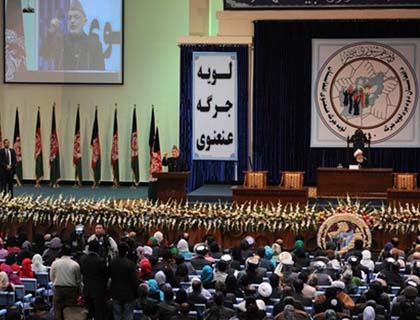As thousands of Afghan representatives and elders have gathered in Kabul to participate in the Loya Jirga that is going to discuss a security agreement between Afghanistan and the US, the prospects for signing a security deal between Kabul and Washington is getting clearer. While both governments of Afghanistan and the United States remain optimistic on reaching a deal, there are still issues in the agreement that is not resolved yet. Given the latest information on the draft of the security agreement between the two countries, the two sides are still haggling on the scope of operations US forces would carry out particularly searching Afghan homes after 2014. Still, the two sides have made compromises for a reaching a deal that could be backed in both countries and endorsed by the Afghan Loya Jirga.
The conflicting reports suggest that despite the two sides pushing for the agreement to be backed by the Afghan Jirga, differences persist and the US is trying to persuade the Afghan government for broader latitude for US residual force. This is while the Afghan government is vehemently opposing to any role of night raid and homes-search operations by the US forces. Leaking the unresolved differences between Kabul and Washington by the Afghan officials could have been carried out intentionally for framing handling the situation in the Loya Jirga. Or, it is also possible that the two sides are remaining silent on some unresolved issues to see the Jirga outcome which would then provide the opportunity for reaching final agreement.
In general, the government of Afghanistan is optimistic and seems to be in control of the handling of the affairs that could result to approval of the agreement by the Loya Jirga. According to Afghan officials, the draft has been finalized, pending for the Loya Jirga endorsement. The officials say it is agreed in the final draft of the security agreement that the bulk of US residual troops will be stationed in Bagram airfield north of Kabul but will have presence in other key corners of the country too. Providing immunity for the residual forces of the United States has been one of the most contentious terms of the security agreement. In the draft, immunity of US troops from Afghan courts is paraphrased to US jurisdiction for pursuing those troops who commit crimes in Afghanistan, making clear that no one would be immune from legal prosecution.
The commonly-called immunity for US troops has been one of the most provocative issues related to the agreement for more conservative circles in Afghanistan. In recent weeks, there have been signs of opposition and protests to the whole agreement, specifically to the exclusive right for Washington to have legal jurisdiction for pursuing those soldieries who commit crimes while being stationed in Afghanistan. The mostly conservative circles who staged protests have been selectively focusing on this specific term of the security agreement. Not surprisingly, most of the organizing figures of the protests are said to have connections with the Taliban or being connected with some neighboring countries who are concerned with the security deal between Afghanistan and the United States.
The protests must have been of high concerns for the US who is remaining wary on Karzai’s move for convening the Loya Jirga to decide on fate of the agreement. Despite the US wariness, President Karzai seems to be more confident that the Jirga will give him a mandate for concluding the deal that would allow presence of thousands of US forces in the country. Perhaps the Afghan government has more precise calculations about the possible behaviors of the Loya Jirga participants on the deal as a document agreed by the Afghan and US governments. The list of the invitees show that a quite majority of the participants are comprised of elected representatives, government officials, women, civil society, representatives of Afghan refugees and other individuals handpicked by the government. Perhaps it is not surprising that the government remains quietly hopeful that the Jirga will endorse the deal agreed between Kabul and Washington.
Despite the protests organized in recent days, the general assumption among the political spectrum, media and the civil society is that the deal agreed by Afghan and US negotiators should be signed and the Afghan government should ensure a prolonged security partnership with the United States. Karzai has also specified that he will commit to any decision from the Loya Jirga. Given the Afghan dependence on the financial aid pledged by the US, there is no option for the Afghan government excepting reaching an acceptable deal with the United States. This is because, it ensures flow of aid to Afghanistan and will help the Afghan government to finance its costly security forces and other government expenses. President Karzai’s assurances that he will abide by any decision from the Loya Jirga is in fact a sign that he is sure of having the mandate from the Loya Jirga.
While the draft of the deal is being put for approval to the Loya Jirga, some contents of it still remain undecided. Though the range expected, the size of the force US would keep in Afghanistan is not finalized yet and is expected to be decided by US president Barack Obama until the end of this year. It is expected that the Obama administration consider a level of troops ranging from 5,000 up to 12,000 to remain in Afghanistan beyond 2014. There seems to be a shift of focus from the size of US troops that will stay in Afghanistan to other issues which will give the Afghan government a better chance to sell the deal to the Loya Jirga participants. For a sustainable security partnership between the two countries, the size of US residual forces matters, as a larger size would definitely help US and Afghanistan to maintain a robust anti-insurgency campaign.

